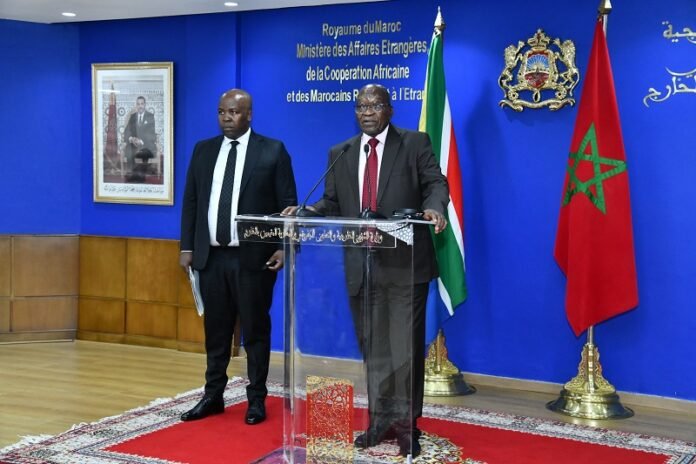President of South Africa’s “uMkhonto we Sizwe” party: History confirms that the Sahara is Moroccan, and autonomy is the realistic solution to resolve this issue
Jacob Zuma, former President of South Africa and leader of the uMkhonto we Sizwe (MK) party, stated that his party believes Morocco’s autonomy plan “would allow tangible local governance by the populations of the Sahara, while guaranteeing Morocco’s sovereignty over the region.”
South Africa and the Moroccan Sahara: Genuine Political Shift or Electoral Maneuver? pic.twitter.com/eC9XH6HiWX
— Diplomatique.ma الدبلوماسية (@diplomatique_ma) July 16, 2025
Zuma expressed this position in a statement to the press following his talks with the Moroccan Minister of Foreign Affairs, African Cooperation, and Moroccans Abroad, Nasser Bourita.
In a statement to the press following his meeting with MFA Nasser Bourita, Mr. Jacob Zuma recalled his historical meeting with His Majesty King Mohammed VI, may God assist Him in 2017 and Morocco's support for the liberation movementhttps://t.co/Ly61AgR8OJ pic.twitter.com/cr04ygfGLr
— Moroccan Diplomacy 🇲🇦 (@Marocdiplo_EN) July 15, 2025
The former South African president added that his party, uMkhonto we Sizwe, “acknowledges the historical and legal context that strengthens Morocco’s claim over the Sahara,” and considers that Morocco’s efforts to recover its full territorial integrity “are in line with the party’s continued commitment to upholding the sovereignty and unity of African states.”
He recognized “the growing international and continental support” the Moroccan initiative has received in recent years, describing the autonomy plan as “a balanced path that strengthens stability, peace, and development in the region.” He called on “the international community to support Morocco’s autonomy plan as an effective means to ensure peace, stability, and prosperity for the people of the Sahara.”
This position aligns with the political stance of the uMkhonto we Sizwe party, which aims to offer a concrete solution to the longstanding debate over the future of the Sahara, as articulated in an official document issued last month titled:
“Strategic Partnership for African Unity, Economic Empowerment, and Territorial Integrity: Morocco.”
This document reaffirms that the Sahara “was part of Morocco before the Spanish colonization at the end of the 19th century. As such, it has been an inseparable part of Morocco for centuries. Morocco’s claim predates colonization and stems from the allegiance of Saharan tribes to the Moroccan throne.”
The text also calls on the international community to “take into account the region’s historical ties to Morocco and the legitimate interests of the Moroccan people in preserving their territorial integrity.”
Lastly, the document highlights the iconic Green March, describing it as “a decolonization initiative and a testament to the historical ties between Morocco and its Sahara,” as well as “a unique and peaceful liberation movement,” in which “over 350,000 unarmed Moroccans entered the Sahara to reclaim their land.”


